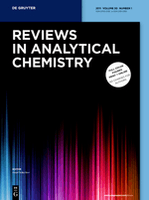
REVIEWS IN ANALYTICAL CHEMISTRY
Scope & Guideline
Advancing Knowledge in Analytical Chemistry
Introduction
Aims and Scopes
- Analytical Techniques Development:
The journal emphasizes the development and refinement of analytical techniques, including mass spectrometry, chromatography, and electrochemical methods, to enhance sensitivity, specificity, and efficiency in various applications. - Application of Analytical Chemistry in Biological Systems:
There is a strong focus on the application of analytical chemistry in biological contexts, such as proteomics, metabolomics, and bioanalysis, highlighting the intersection of chemistry and life sciences. - Innovative Sensor Technologies:
The journal frequently explores the design and application of novel sensor technologies, including biosensors and nanotechnology-driven devices, for environmental monitoring, medical diagnostics, and other practical applications. - Microfluidics and Miniaturization:
A core area of interest is the development of microfluidic systems and portable instrumentation that facilitate analysis at smaller scales, promoting efficiency and accessibility in analytical processes. - Education and Outreach in Analytical Chemistry:
The journal also addresses educational advancements and emerging trends in analytical chemistry education, aiming to engage the next generation of chemists.
Trending and Emerging
- Integration of Machine Learning and AI in Analytical Chemistry:
Recent publications show a significant increase in the application of machine learning and artificial intelligence to enhance data analysis, modeling, and predictive capabilities in analytical chemistry. - Advancements in Point-of-Care Testing:
There is a notable trend towards the development of portable and user-friendly point-of-care diagnostic tools, driven by the need for rapid and accessible health assessments, especially highlighted during the COVID-19 pandemic. - Biomolecular and Bioanalytical Methods:
Emerging themes include the development of sophisticated biomolecular techniques, such as CRISPR-based biosensing, reflecting a growing interest in the intersection of analytical chemistry with molecular biology and genetics. - Nanotechnology in Sensing and Imaging:
The integration of nanotechnology in sensor design and imaging techniques is increasingly prevalent, showcasing the potential for enhanced sensitivity and specificity in various analytical applications. - Microfluidic and Miniaturized Systems:
The trend towards microfluidics continues to grow, with a focus on innovative designs that facilitate complex analyses in a compact format, making them suitable for diverse applications from clinical diagnostics to environmental monitoring.
Declining or Waning
- Traditional Analytical Techniques:
There seems to be a waning interest in conventional analytical techniques that do not integrate advanced technologies or novel methodologies, as the field shifts towards more innovative approaches. - Focus on Environmental Chemistry:
Although still relevant, publications specifically centered on traditional environmental chemistry topics have decreased, possibly due to the rise of more interdisciplinary approaches that integrate environmental concerns with other analytical methods. - Basic Theoretical Studies:
There is a noticeable decline in papers focused solely on theoretical aspects of analytical chemistry, as the journal increasingly prioritizes practical applications and technological advancements.
Similar Journals
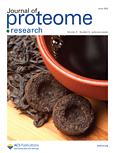
JOURNAL OF PROTEOME RESEARCH
Advancing the Frontiers of ProteomicsJOURNAL OF PROTEOME RESEARCH is a premier publication in the field of proteomics, disseminating cutting-edge research and methodologies that drive advancements in biochemistry and molecular biology. Published by the American Chemical Society, this esteemed journal boasts a robust impact, as evidenced by its Q1 rankings in both Biochemistry and miscellaneous Chemistry categories for 2023. With a reputation bolstered by a solid Scopus ranking—#64 out of 408 in General Chemistry and #80 out of 438 in Biochemistry—the journal serves as an essential resource for researchers, professionals, and students aiming to deepen their understanding of protein functions and interactions in biological systems. Although it does not operate under an open-access model, the JOURNAL OF PROTEOME RESEARCH remains a critical platform for scholarly discourse, committed to publishing high-quality, peer-reviewed articles through 2024 and beyond. Scholars are encouraged to engage with the pioneering studies and reviews that shape the future of proteomics.
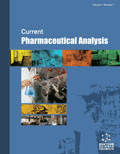
Current Pharmaceutical Analysis
Pioneering Analytical Methodologies for Tomorrow's MedicinesCurrent Pharmaceutical Analysis, published by Bentham Science Publishers Ltd, is a vital resource for professionals and researchers in the fields of Pharmaceutical Science, Biochemistry, and Molecular Medicine. Established in 2006, this peer-reviewed journal aims to provide a platform for the latest advancements and analytical methodologies in pharmaceutical research and drug development. Over the years, it has garnered attention for its rigorous scrutiny and contributions to the landscape of pharmacology, evidenced by its quartile placements in various categories, most notably Q3 in Pharmaceutical Science. Despite its current rankings placing it in the lower quartile in several disciplines, the journal remains an essential venue for both emerging and established researchers seeking to disseminate their findings. With the widespread accessibility of its articles, researchers, professionals, and students can engage with cutting-edge studies to foster innovation in pharmaceutical analysis. For access to the latest research contributions, readers can explore the digital archive and stay updated on pivotal discussions shaping the future of the pharmaceutical sciences.

BUNSEKI KAGAKU
Empowering the Next Generation of ChemistsBUNSEKI KAGAKU, published by the Japan Society Analytical Chemistry, is a reputable journal dedicated to the field of analytical chemistry. With an ISSN of 0525-1931, this journal has been a crucial outlet for scholarly communication since its inception in 1952, converging its publication years from 1954 to 1957 and from 1959 to 2024. Although it holds a Q4 category ranking in the most recent 2023 quartiles of analytical chemistry and ranks 153/156 in Scopus, it continues to serve as a platform for quality research, fostering advancements in the field. BUNSEKI KAGAKU is based in Tokyo, Japan, and emphasizes the critical importance of analytical techniques in scientific inquiry. With a commitment to professionalism and rigor, the journal provides a vital resource for researchers, students, and professionals seeking to explore innovative methodologies and contribute to the ongoing dialogue in analytical chemistry.
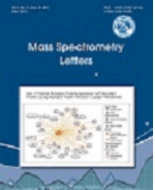
Mass Spectrometry Letters
Empowering Researchers through Open Access Discoveries.Mass Spectrometry Letters is a pioneering open-access journal published by the Korean Society for Mass Spectrometry, specializing in the diverse fields of analytical chemistry, biochemistry, and spectroscopy. Established in 2010, this journal aims to disseminate groundbreaking research and advancements in mass spectrometry and its applications across various scientific domains. Though currently categorized in the Q4 quartile in key analytical fields, Mass Spectrometry Letters serves as an essential platform for researchers, professionals, and students to share innovative methodologies, emerging trends, and practical applications of mass spectrometry, thus fostering collaboration and advancing knowledge in the scientific community. With a commitment to open access, articles published since 2010 are readily available, enabling widespread distribution and engagement within the international research community. Located in Daejeon, South Korea, and actively converging research through 2024, the journal holds the potential to grow its impact and relevance within the dynamic landscape of mass spectrometry.
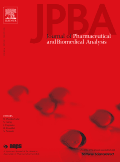
Journal of Pharmaceutical and Biomedical Analysis
Exploring the intersection of analytical chemistry and biomedicine.The Journal of Pharmaceutical and Biomedical Analysis, published by ELSEVIER and available in print and online formats, stands as a pivotal source of knowledge in the realms of Analytical Chemistry, Clinical Biochemistry, Drug Discovery, and Pharmaceutical Science. With an ISSN of 0731-7085 and an e-ISSN of 1873-264X, this journal is dedicated to publishing high-quality research that advances the understanding and development of analytical techniques in pharmaceuticals and biomedicine. The journal has earned a solid reputation, reflected in its Q2 category rankings across five distinct fields for 2023, and boasts impressive Scopus rankings, signaling its robust impact within the academic community. The Journal of Pharmaceutical and Biomedical Analysis serves as an essential resource for researchers, professionals, and students alike, providing actionable insights and fostering innovation that can directly influence future advancements in drug development and biomedical applications.

Analytical and Bioanalytical Chemistry Research
Pioneering Insights in Bioanalytical Research.Analytical and Bioanalytical Chemistry Research is an esteemed open-access journal published by the Iranian Chemical Society, dedicated to the advancement of knowledge in the fields of analytical chemistry, biochemistry, and spectroscopy. Since its inception in 2014, this journal has provided a platform for researchers, professionals, and students to publish and access high-quality research articles that contribute to the understanding of chemical analysis and bioanalytical methods. With an ISSN of 2383-093X and an open-access model that promotes global dissemination of findings, it ensures that innovative research reaches a broad audience. The journal has consolidated its presence in the scientific community, currently ranked in quartile Q4 for analytical chemistry, biochemistry, and spectroscopy as of 2023. Its Scopus rankings, including a percentile of 34th in Analytical Chemistry, reflect its commitment to quality research and scholarly contribution. Situated in Tehran, Iran, the journal serves as a vital resource for academic discourse, offering insights into emerging trends and methodologies in analytical and bioanalytical chemistry.

LCGC North America
Fostering Discussion and Advancing Analytical PracticesLCGC North America is a pivotal resource in the field of Analytical Chemistry, published by MJH Life Sciences. Since its inception in 1999, the journal has strived to bridge the gap between scientific research and practical applications, catering to a diverse audience that includes researchers, professionals, and students interested in chromatography and related analytical practices. Although currently categorized in the Q4 quartile of Analytical Chemistry, with a Scopus rank of #137 out of 156, LCGC North America is dedicated to delivering insightful articles that foster discussion and innovation within the analytical chemistry community. With a commitment to quality content, the journal covers a broad spectrum of topics, ensuring that readers remain informed about the latest developments and trends in the field. Despite its non-open access model, readers can access its valuable resources through institutional subscriptions and various library networks, making it a vital asset for those engaged in cutting-edge research and practice. Located in Cranbury, NJ, United States, LCGC North America continues to contribute significantly to the advancement of analytical methodologies and technologies.
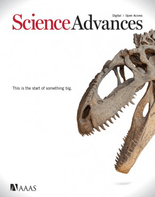
Science Advances
Unleashing Multidisciplinary InnovationsScience Advances, published by the American Association for the Advancement of Science, is a leading open-access journal in the field of multidisciplinary sciences. Since its inception in 2015, it has rapidly gained prominence, achieving a remarkable Q1 ranking in both Medicine (miscellaneous) and Multidisciplinary categories, underlining its impact and relevance in contemporary research. With an impressive Scopus ranking of #7 out of 171 in the Multidisciplinary field, it proudly sits in the 96th percentile, showcasing its dedication to disseminating high-quality research across various scientific domains. This journal not only provides open access to innovative findings but also aims to foster collaboration and maintain a high standard of scholarly communication among researchers, professionals, and students globally. Stay updated with some of the most groundbreaking advancements and contribute to the collective pursuit of scientific knowledge through Science Advances.
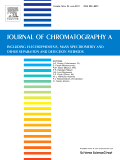
JOURNAL OF CHROMATOGRAPHY A
Elevating Standards in Organic Chemistry ResearchJOURNAL OF CHROMATOGRAPHY A, published by Elsevier, is a leading journal in the disciplines of Analytical Chemistry, Biochemistry, and Organic Chemistry, boasting an impressive 2023 Q2 categorization across multiple fields. With an ISSN of 0021-9673 and an E-ISSN of 1873-3778, this prestigious journal has been at the forefront of chromatography research since its inception in 1958. The journal serves as a vital platform for disseminating high-quality research articles, reviews, and insights into the latest developments in chromatographic techniques and applications, reflecting its standing in the top tier of analytical and organic chemistry literature, evidenced by its impressive Scopus rankings. While it currently operates under a subscription model, the journal continues to make significant contributions to the scientific community by fostering collaboration and innovation in chromatography methodologies. We invite researchers, professionals, and students to engage with the essential findings shared within its pages, which are foundational for advancements in various scientific fields, making it an indispensable resource for enhancing chromatographic knowledge and practice.
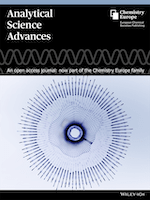
Analytical Science Advances
Advancing the Frontiers of Analytical ChemistryAnalytical Science Advances is a dynamic journal published by WILEY, dedicated to the ever-evolving field of analytical chemistry. With an ISSN of 2628-5452, this open-access platform aims to disseminate high-quality research and insightful reviews that push the boundaries of analytical methodologies and instrumentation. Since its inception in 2020, the journal has gained traction, securing a commendable Q2 ranking in 2023 within its category, highlighting its significance in the scientific community. Currently positioned at Rank #68 out of 156 in Scopus' analytical chemistry category, it boasts a 56th percentile ranking, reflecting its contributions to advancing analytical techniques. Researchers, professionals, and students will find this journal an invaluable resource for keeping abreast of the latest developments, emerging technologies, and innovative approaches in analytical science, ensuring the journal's relevancy and influence in shaping future discoveries.